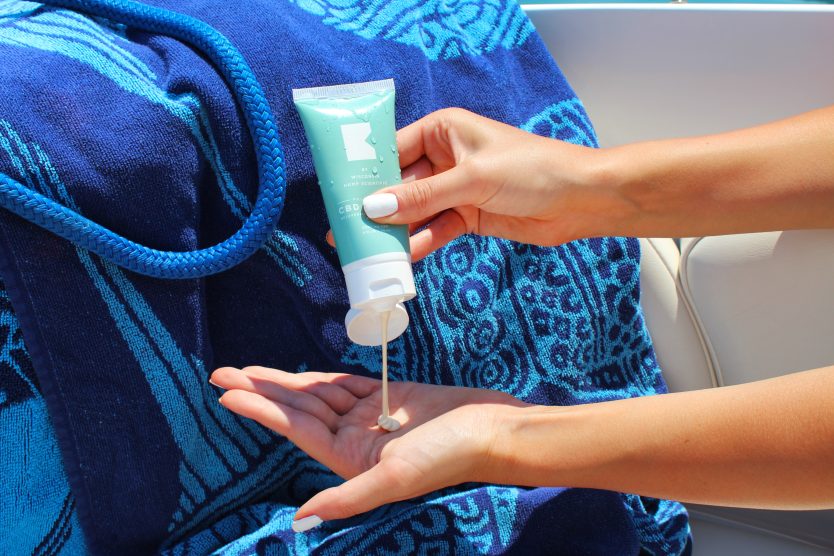We all know skin protection is important in the dog days of summer, but it’s actually vital all year round.
Even in the winter months, the bright sun and reflection off snow can cause skin damage. And you aren’t just at risk on a sunny day. When it’s overcast, up to 80 percent of the sun’s UV radiation still reaches the earth, meaning that if you’re not protected on an overcast day, you can still suffer skin damage.1
So make sure you never forget sunscreen!
Why is Sunscreen Important?
One of the easiest ways to protect your skin is to apply sunscreen. It can help prevent a host of issues, including sunburn, premature aging and skin cancer.2 Sunscreen should be part of your health regimen, along with proper diet and exercise, to maintain your well-being.
When you’re choosing a sunscreen, pay attention to the SPF, or sun protection factor, a measure of the sunscreen’s ability to protect against UVB rays. This ultraviolet light is responsible for sunburns and skin cancer. Choose a broad spectrum sunscreen that will protect against UVB and UVA rays, which can also put you at risk for aging and skin cancer. Look for an SPF of at least 30.2
Who should use sunscreen? The Skin Cancer Foundation says everyone over the age of six months old. It doesn’t matter if you tan easily or not. Your skin is damaged by sun exposure over your lifetime, whether or not you burn. The best prevention is to stay out of the sun, and in particular keep infants safe with shade structures and sun-protective clothing.1
Sunscreen Is Important, But Not Enough
It’s true that sunscreen has proven to be effective in reducing UV radiation to the skin. Reviews of experimental evidence show that topical sunscreens can decrease the amount of ultraviolet radiation to which the skin is exposed.3 Other studies state that its effectiveness has translated into a reduced melanoma risk in the long term.4
But the same review of those studies has stated that public health recommendations need to emphasize that sunscreen is for sun protection, and not to prolong time in the sun. Other means of sun protection are also important.4 The Skin Cancer Foundation echoes that, stating that “sunscreen alone isn’t enough to keep you safe in the sun.”1
Stay in the shade if possible, wear sun-safe clothing and a wide-brimmed hat, and don’t forget the important role of UV-blocking sunglasses. And when you do wear your bikini, put on sunscreen and re-apply every two hours, and after swimming.1
That doesn’t mean you need to stay inside, though. Being outdoors is the natural way to get vitamin D, and also can help reduce stress and provide a host of other benefits. If you work or play outside, you should take steps to protect your skin and reduce your skin cancer risk.5
And remember that protection is vital all year, not just during the summer. UV rays reach you on cloudy and cool days, and they reflect off of surfaces like water, cement, sand, and snow.5 Watch for your local UV index, which forecasts the strength of UV rays each day, and especially if it is three or higher, take extra steps to protect your skin.5
Why You Should Protect Your Skin
One of the main reasons to wear sunscreen and take other measures to protect your skin is the risk of skin cancer. Most skin cancers are caused by too much exposure to ultraviolet light, those invisible rays that are actually a kind of radiation, damaging skin cells.5
Melanoma is one of the most dangerous forms of skin cancer, and it can spread to other organs in the body where it can cause death. Other kinds of skin cancer (cutaneous squamous cell carcinoma and basal cell carcinoma) are usually localized skin cancers, but can spread or cause disfigurement. Early detection is vital.6
That means it’s important that you watch for changes in your skin, so any type of skin cancer can be detected early. Watch for conditions like a pearly or waxy bump; a red nodule; a large brownish spot; a bleeding or scabbing sore that heals and returns; a mole that changes in color, size or feel or that bleeds; or other changes to your skin.7
See a Doctor
Don’t leave an unknown skin condition to chance. Make an appointment to see a physician and explain your concerns if you have any changes to your skin that are worrisome. It’s true that not all skin changes are caused by skin cancer, but it’s important to be sure.7 Use our physician finder to seek out a doctor near you for proper diagnosis and treatment.
















